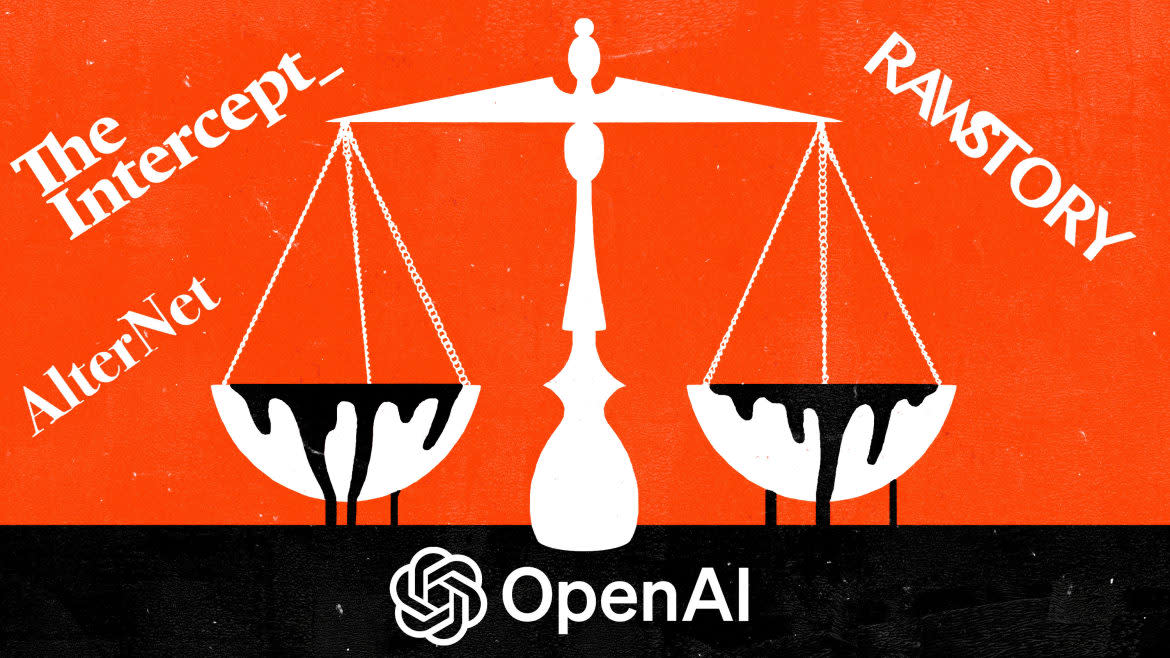The Intercept and Raw Story, Progressive News Stalwarts, Sue OpenAI

Three prominent progressive outlets sued OpenAI on Wednesday, alleging the company violated their copyright protections in an extension of the battle lines drawn between news publishers and AI companies.
The two lawsuits—a joint suit by Raw Story and AlterNet and another by The Intercept—were filed in federal court in Manhattan. The two complaints allege OpenAI’s ChatGPT violated the Digital Copyright Millennium Act when it “trained ChatGPT not to acknowledge or respect copyright, not to notify ChatGPT users when the responses they received were protected by journalists’ copyrights, and not to provide attribution when using the works of human journalists.”
John Byrne, the CEO of both Raw Story and AlterNet, told The Daily Beast an AI expert hired by his companies’ lawyer found Raw Story and AlterNet’s articles were among those crawled by OpenAI’s systems. The companies have since blocked both ChatGPT and Google’s Bard systems from accessing their data, he added.
OpenAI’s Video Generator Sora Is Stunning and Utterly Terrifying
“I think it's time for tech companies to be proactive in compensating publishers for their work,” Byrne said “What we've seen time and time again with big tech is the ‘We break it and then we try to remedy it after.’ And I think it's important to recognize that we've spent millions of dollars on journalism over the last 20 years, and it's not for people to just pick it up and strip the copyright off of it and present it as their own work.”
OpenAI did not immediately respond to a request for comment.
The court filings follow The New York Times’ landmark lawsuit filed last year against OpenAI and Microsoft over alleged copyright violations. Microsoft is also a defendant in The Intercept’s lawsuit, though Bryne said he opted not to sue Microsoft due to a news partnership his companies have with the tech giant. Microsoft did not immediately respond to a request for comment.
“This is a time when non-profit news organizations are struggling to find sufficient financial support for journalism that holds companies like Microsoft and OpenAI to account. As newsrooms throughout the country are decimated by financial imperatives to cutback, OpenAI reaps the benefits of our content,” Annie Chabel, Chief Executive Officer of The Intercept, said in a statement. “We hope this lawsuit will send a strong message to AI developers who chose to ignore our copyrights and free ride on the hard work of our journalists.”
The media outlets’ argument centers around the Digital Millennium Copyright Act, a 1998 law that prevents the removal of copyrighted information when using work with copyright protections. The companies alleged OpenAI removed the identifying copyrighted information when feeding their content into ChatGPT. The Times cited violations of the DMCA as one of the pillars of its own lawsuit, though OpenAI pushed back against the Times’ DMCA claims in a filing this week.
“Raw Story’s copyright-protected journalism is the result of significant efforts of human journalists who report the news,” Raw Story publisher Roxanne Cooper said in a statement. “Rather than license that work, OpenAI taught ChatGPT to ignore journalists’ copyrights and hide its use of copyright-protected material.”
News outlets have taken opposing stances to generative AI’s impact. OpenAI has inked agreements with organizations like the Associated Press and Politico and Business Insider owner Axel Springer to allow their articles to train ChatGPT’s systems, though agreements between other news publishers average between $1 million to $5 million annually, according to The Information.
OpenAI Releases Plan to Prevent a Robot Apocalypse
Other companies have reportedly spoken to companies including OpenAI and Apple about deals, including IAC (the parent company of The Daily Beast), News Corp., and Condé Nast, according to the Times. Some news outlets have tackled AI head-on: Bloomberg has focused on its own AI programs, the Times reported in December, while The Washington Post has been vocal about its in-house plans to explore AI’s use in journalism.
Byrne said his companies had not spoken to OpenAI about a partnership and believed a lawsuit to be the best recourse to protect his websites’ copyrights. That does not mean he’s entirely opposed to working with other AI platforms, however.
“If we’re compensated for our work, we’re certainly willing to work with people,” Byrne said.
Get the Daily Beast's biggest scoops and scandals delivered right to your inbox. Sign up now.
Stay informed and gain unlimited access to the Daily Beast's unmatched reporting. Subscribe now.

